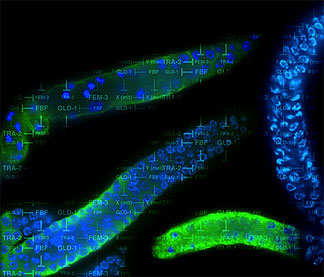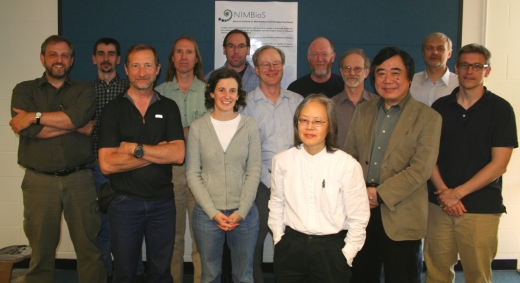| Description | Participants | Summaries | Products |
|---|

Archived NIMBioS Working Group
Intragenomic Conflict
Topic: Intragenomic Conflict
Meeting dates: April 20-22, 2009
Organizer: Francisco Ubeda de Torres (Ecology and Evolutionary Biology, Univ. of Tennessee); Andy Gardner (Ashworth Laboratories, Edinburgh, UK); Jon Wilkins (Santa Fe Institute, Santa Fe, NM)
Objectives: Two genes clash when the spread of one allele favors the spread of another allele with the opposite effect. There are two ways in which one gene can create the context for the spread of a second gene. The first is biasing transmission at a cost to the rest of the genome; the second is diverting resources to itself or related individuals. Attempts to bias transmission accounts for meiotic drive and gene conversion, while attempts to divert resources accounts for genomic imprinting and green bear effects, among others. The more interesting and realistic questions related to the evolution of Mendelian segregation, sex chromosomes, recombination and gene expression are limited by the mathematical complexity of the corresponding models.
In this workgroup we want to bring together biologists working on intragenomic conflict and mathematicians interested in evolutionary theory. The questions to be answered by the working group are: What do conflicting genes have in common? What makes them different? What is the difference between competing and conflicting genes? What do models of imprinted genes have in common? What makes them different? Is one type of modeling better than other for modeling intragenomic conflict? What is the equivalence between different types of models? What aspects of intragenomic conflict require new types of models? What are the possible outcomes of intragenomic conflict? When can we say that conflict has been resolved?

Meeting Summaries
| Mtg # | Dates | Agenda | Summary | Photo | Evaluation |
|---|---|---|---|---|---|
| 1 | Apr 20-22, 2009 | Link | Link | Report |
Meeting 1 Summary. This group reviewed the field of intragenomic conflict and addressed the elusive definition of intragenomic conflict. The group also addressed conflict resolution and its possible outcomes. In addition, the group established links between intragenomic conflict and evolutionary processes, namely, what is the role of intragenomic conflict in the major transitions in evolution (mutli-level selection, higher evolution, subfunctionalization, modularity). We also discussed the role of intragenomic conflict and innovation (cross adaptive valleys, co-opt resistance for new functions, pleiotropy), genetic architecture (karyotype evolution, centromeres, recombination rate, biased gene conversion), and speciation. Once a common language and basis have been established, this discussion will be continued online.
 |
| (Back row, L to R): Jon Wilkins, Francisco Ubeda de Torres, Sean Rice, Troy Day, David Queller, David Haig, Jack Werren, Sergey Gravilets; (Front row, L to R): Bill Rice, Kelly Dyer, Marcy Uyenoyama, Ichizo Kobayashi, Geoff Wild; (Not Pictured): Andy Gardner. |
NIMBioS Working Groups are chosen to focus on major scientific questions at the interface between biology and mathematics. NIMBioS is particularly interested in questions that integrate diverse fields, require synthesis at multiple scales, and/or make use of or require development of new mathematical/computational approaches. NIMBioS Working Groups are relatively small (up to 10 participants), focus on a well-defined topic, and have well-defined goals and metrics of success. Working Groups will meet up to 3 times over a two-year period, with each meeting lasting up to 2.5 days.
A goal of NIMBioS is to enhance the cadre of researchers capable of interdisciplinary efforts across mathematics and biology. As part of this goal, NIMBioS is committed to promoting diversity in all its activities. Diversity is considered in all its aspects, social and scientific, including gender, ethnicity, scientific field, career stage, geography and type of home institution. Questions regarding diversity issues should be directed to diversity@nimbios.org. You can read more about our Diversity Plan on our NIMBioS Policies web page. The NIMBioS building is fully handicapped accessible.
NIMBioS
1122 Volunteer Blvd., Suite 106
University of Tennessee
Knoxville,
TN 37996-3410
PH: (865) 974-9334
FAX: (865) 974-9461
Contact NIMBioS


